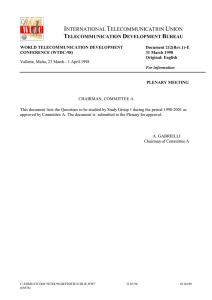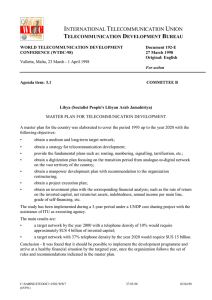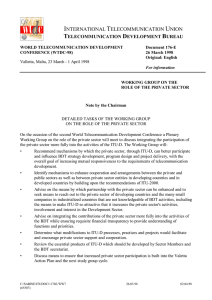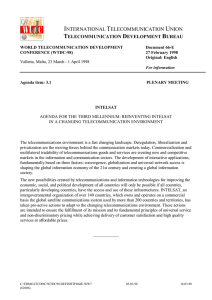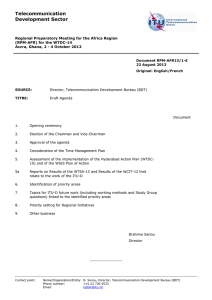I T U D
advertisement
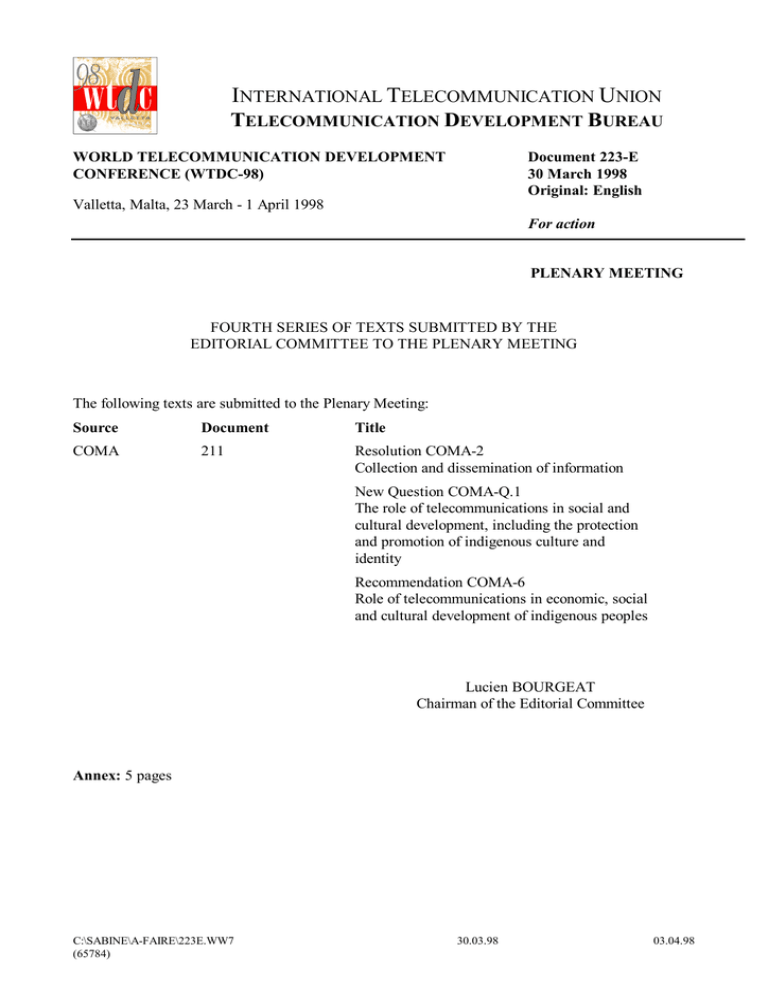
I NTERNATIONAL TELECOMMUNICATION UNION TELECOMMUNICATION DEVELOPMENT BUREAU Document 223-E 30 March 1998 Original: English WORLD TELECOMMUNICATION DEVELOPMENT CONFERENCE (WTDC-98) Valletta, Malta, 23 March - 1 April 1998 For action PLENARY MEETING FOURTH SERIES OF TEXTS SUBMITTED BY THE EDITORIAL COMMITTEE TO THE PLENARY MEETING The following texts are submitted to the Plenary Meeting: Source Document Title COMA 211 Resolution COMA-2 Collection and dissemination of information New Question COMA-Q.1 The role of telecommunications in social and cultural development, including the protection and promotion of indigenous culture and identity Recommendation COMA-6 Role of telecommunications in economic, social and cultural development of indigenous peoples Lucien BOURGEAT Chairman of the Editorial Committee Annex: 5 pages C:\SABINE\A-FAIRE\223E.WW7 (65784) 30.03.98 03.04.98 -2CMDT98/223-E RESOLUTION COMA-2 COLLECTION AND DISSEMINATION OF INFORMATION The World Telecommunication Development Conference (Valletta, 1998), considering a) that a key role for ITU-D will be the sharing and dissemination of information; b) Recommendation 2 of the African Regional Telecommunication Development Conference (AF-RTDC-96) which requested BDT to continue to survey countries, to prepare reports on an annual basis and to establish appropriate mechanisms and modalities by which countries can access the information; c) Resolutions 3, 6, 7 and 8 and Recommendations 3 and 4 of the Regional Telecommunication Development Conference for the Arab States (AR-RTDC-96); d) the importance of the existing BDT databases, in particular the indicators database and the regulatory database; e) the usefulness of reports such as the World Telecommunication Development Report and the draft Report on Trends in Telecommunication Restructuring; f) the work done to produce the Blue Book for the Americas, the African Green Paper and the Arab Book, considering further a) that the telecommunication sector is reforming at an incredible pace; b) that policy approaches vary and countries can benefit from the experiences of others, recognizing a) that by acting as a clearing house for the exchange of information, ITU/BDT will be able to assist Member States in making informed national policy choices; b) that the countries must actively participate in this endeavour in order to make it successful, recognizing further that this kind of information is extremely useful to the work of the study groups and assisting the ITU to assess the telecommunication landscape, C:\SABINE\A-FAIRE\223E.WW7 (65784) 30.03.98 03.04.98 -3CMDT98/223-E requests the Director of BDT 1 to support this activity by providing adequate resources; 2 to continue to survey countries and produce world and regional reports which highlight country lessons and experiences, in particular on: • trends in telecommunication sector reform; • world telecommunication development; • trends on tariff policies in collaboration with the relevant bodies of ITU-T; • implementation of the General Agreement on Trade in Services; 3 to provide indicator and regulatory information on the ITU Web site and to establish appropriate mechanisms and modalities for countries which do not have electronic access to obtain this information; 4 to provide technical assistance to regulatory authorities for the development of national telecommunication databases containing statistical and policy and regulatory information, including support for making information available electronically and training of personnel in skills related to the process, invites Member States and Sector Members to participate actively in this endeavour by providing the information solicited, encourages donor agencies, as well as ITU non-members, to cooperate in providing relevant information on their activities. C:\SABINE\A-FAIRE\223E.WW7 (65784) 30.03.98 03.04.98 -4CMDT98/223-E NEW QUESTION COMA-Q.1 THE ROLE OF TELECOMMUNICATIONS IN SOCIAL AND CULTURAL DEVELOPMENT, INCLUDING THE PROTECTION AND PROMOTION OF INDIGENOUS CULTURE AND IDENTITY 1 Question for study The role of telecommunications in social and cultural development, including the protection and promotion of indigenous culture and identity. 2 Statement of the situation or problem The development of telemedicine and distance-learning facilities are already recognized as providing significant social benefits. Likewise, access to and participation in improved telecommunication facilities can provide significant benefits in the cultural development of a country. This is particularly so when indigenous people are not the majority culture of a country. 3 Question or issue for study What are the barriers to access to telecommunication systems and facilities by indigenous peoples? 4 Expected output Identification of any existing barriers, together with a recognition that policies and development activities will need to take account of any barriers. 5 Timing Study period 1998-2002. 6 Proposers/sponsors WTDC (Valletta, 1998). 7 Sources of input Member States, non-governmental organizations and other organizations representing indigenous peoples, UNESCO. 8 Target audience Policy-makers, telecom regulators, national planning authorities, any other forums where cultural development of indigenous peoples is being considered. C:\SABINE\A-FAIRE\223E.WW7 (65784) 30.03.98 03.04.98 -5CMDT98/223-E 9 Proposed methods of handling the Question or issue Within a study group, over the study period and within regular BDT activities. 10 Coordination With regular ITU-D studies, other study group Questions and regional organizations. C:\SABINE\A-FAIRE\223E.WW7 (65784) 30.03.98 03.04.98 -6CMDT98/223-E RECOMMENDATION COMA-6 ROLE OF TELECOMMUNICATIONS IN ECONOMIC, SOCIAL AND CULTURAL DEVELOPMENT OF INDIGENOUS PEOPLES The World Telecommunication Development Conference (Valletta, 1998), considering a) that telecommunications is a basic tool for the economic, social and cultural development of countries; b) that the cultural development of a country needs to recognize both majority and minority cultures within the population; c) that access to and participation in telecommunication systems by indigenous peoples has a particular set of issues associated with it, noting a) that access to modern telecommunication facilities for all peoples is a basic ingredient of a successful economy; b) that, in order for indigenous peoples to benefit from telecommunications there is a need for: • education and information to ensure that the benefits of telecommunications are recognized by indigenous peoples • identification of any barriers to access to telecommunication systems and overcoming these barriers; c) that the overall success of any telecommunication development programme will be dependent on, amongst other things, identification and addressing the needs of any indigenous peoples served by the programme, recommends that, in its work programmes and activities, BDT pay particular attention to the role of telecommunications in meeting the needs for economic, social and cultural development of indigenous peoples. ________ C:\SABINE\A-FAIRE\223E.WW7 (65784) 30.03.98 03.04.98
